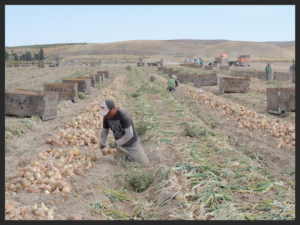There’s a reason we still celebrate Farmworker Awareness Week each year.
Despite landmark events over the past six decades — from the broadcast of Edward R. Murrow’s “Harvest of Shame” in 1960 through the campaigns of Cesar Chavez’s United Farmworkers in the 1970s, the supply chain agreements of the Farm Labor Organizing Committee in the 1980s, the organizing of tomato workers in Immokalee and the more recent success of Oregon farmworkers on documentation and minimum wage — most consumers just don’t pay enough attention to the challenges facing those who harvest our fruits and vegetables.
 Across those same decades, the produce industry itself has too often taken workers for granted. Thanks to an abundant labor supply, workers were seen as interchangeable, rather than as skilled and valuable assets. But that perception may well be changing. Enhanced immigration enforcement has significantly tightened the agricultural labor market, raising concerns among growers who can’t find the workers they need to harvest their crops.
Across those same decades, the produce industry itself has too often taken workers for granted. Thanks to an abundant labor supply, workers were seen as interchangeable, rather than as skilled and valuable assets. But that perception may well be changing. Enhanced immigration enforcement has significantly tightened the agricultural labor market, raising concerns among growers who can’t find the workers they need to harvest their crops.
Meanwhile, as US growers increasingly source from Mexico to provide year-round supply, labor unrest and press accounts of harsh working conditions south of the border have convinced the produce industry that there are major vulnerabilities in its sprawling global supply chains. Many insiders acknowledge that “social compliance” is now as urgent a priority as food safety, an issue that always grabs consumers’ attention.
As an unusual collaboration among retail, grower, labor and consumer organizations, the Equitable Food Initiative sees a tremendous opportunity for transformation in the produce industry. We believe that well-trained and fairly compensated workers can be a huge part of the solution to the industry’s food safety and labor challenges. Our work with Costco Wholesale, Whole Foods and eight of their produce suppliers is already demonstrating that engaged and motivated workers can verify ongoing compliance with our rigorous standards. This spring, our first certified strawberries will be on Costco shelves with the “Responsibly Grown. Farmworker Assured.” ™ label. More product will be available as the season advances, and we hope other retailers will join in supporting their suppliers to achieve EFI certification.
But beyond the assurance of compliance, EFI’s experience with growers so far shows that new forms of labor-management collaboration can also create other forms of value. As with any industry, experienced farmworkers know a great deal about the produce they harvest, and can use the problem-solving skills they learn through EFI to explore ways to improve the production process, reduce waste and retain labor in a tight market. As more suppliers get involved, there are also opportunities for sharing best practices: rather than dictating how things should be done, EFI aims to build on the inherent knowledge that workers and their supervisors already bring to their profession. As EFI evolves, we learn and grow through the insight of our stakeholders.
Among our early-adopters is NatureSweet Tomatoes, a San Antonio-based company with multiple facilities in Mexico and Arizona. NatureSweet is “dedicated to increasing the sustainability of the land and the lives of all those surrounding our product.” But by investing in the capacity of its workforce, the company also sees a significant competitive opportunity, and talks about a produce industry “ripe for disruption.” All the growers we talk to seek to tap the potential of their workforce and promote a change of culture in the industry. EFI is excited to be part of what we see as a positive transformation. And it all starts with an awareness that farmworkers bring tremendous skill and knowledge to their trade. This week should be about helping to spread that awareness.
(Post first appeared on the Farmworker Justice blog as a guest posting written by Peter O’Driscoll)
Peter O’Driscoll
Executive Director, EFI

